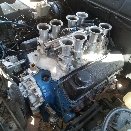-
Content Count
1,827 -
Joined
-
Last visited
-
Days Won
13
Reputation Activity
-
 Crazy2287 got a reaction from deankxf in Ball Joint Spacer - For lowered not raised cars
Crazy2287 got a reaction from deankxf in Ball Joint Spacer - For lowered not raised cars
the problem with wedges is that it will cause misalignment and shearing action on the bolts used to hold the ball joint on. Not really ideal, I cut the mount out of my upper arm and weld it in a new one.
also putting a wedge in will increase the angle of the upper arm and depending on how low you want to put your car you will end up with your upper arm binding against the tower. From here you can machine the back of upper arms get more clearance.
if you are going to wedge make sure you try to do it so the top and the bottom of the bolts are bolting on a square surface, you may achieve this by wedging the underside of the top and bottom of the bolt by equal and opposite angles, and it should be fine. make sure you use high tensile 8.8 or 10 grade bolts.
The better option is to purchase upper arms that are already modified with angles to correct ball joint binding these exist and are cheaper now than they were when I had to make my own arms.
-
 Crazy2287 reacted to Thom in Best Disks and pads for an XE?
Crazy2287 reacted to Thom in Best Disks and pads for an XE?
A minor upgrade you if you can modify a hq caliper to fit they have a 1/8th' bigger piston, the hq racers used a falcon rotor with a hq caliper with reasonable results
-
 Crazy2287 got a reaction from deankxf in Best Disks and pads for an XE?
Crazy2287 got a reaction from deankxf in Best Disks and pads for an XE?
Mr Polson is on it.
Exactly what he said. I've raced tarmac a few times on DBA T2's Slotted only, with bendex ult pads. The pads ended up getting cooked but rotors survived, so they well over 550deg C. and i've swapped to a higher temp compound pad for now.
For street use. Standard bendex are easily available, and good reliable quality. You dont need ultimates or special compounds unless your racing.
Do not get crossed drilled rotors. They are for looks only. Cross drilling atcually reduces the effectivness of the rotor as it lowers thermal mass. It also create failure points making the rotor more prone to flying to bits on the track.
-
 Crazy2287 got a reaction from deankxf in Best Disks and pads for an XE?
Crazy2287 got a reaction from deankxf in Best Disks and pads for an XE?
Mr Polson is on it.
Exactly what he said. I've raced tarmac a few times on DBA T2's Slotted only, with bendex ult pads. The pads ended up getting cooked but rotors survived, so they well over 550deg C. and i've swapped to a higher temp compound pad for now.
For street use. Standard bendex are easily available, and good reliable quality. You dont need ultimates or special compounds unless your racing.
Do not get crossed drilled rotors. They are for looks only. Cross drilling atcually reduces the effectivness of the rotor as it lowers thermal mass. It also create failure points making the rotor more prone to flying to bits on the track.
-
 Crazy2287 got a reaction from deankxf in Best Disks and pads for an XE?
Crazy2287 got a reaction from deankxf in Best Disks and pads for an XE?
Mr Polson is on it.
Exactly what he said. I've raced tarmac a few times on DBA T2's Slotted only, with bendex ult pads. The pads ended up getting cooked but rotors survived, so they well over 550deg C. and i've swapped to a higher temp compound pad for now.
For street use. Standard bendex are easily available, and good reliable quality. You dont need ultimates or special compounds unless your racing.
Do not get crossed drilled rotors. They are for looks only. Cross drilling atcually reduces the effectivness of the rotor as it lowers thermal mass. It also create failure points making the rotor more prone to flying to bits on the track.
-
 Crazy2287 got a reaction from deankxf in Best Disks and pads for an XE?
Crazy2287 got a reaction from deankxf in Best Disks and pads for an XE?
Mr Polson is on it.
Exactly what he said. I've raced tarmac a few times on DBA T2's Slotted only, with bendex ult pads. The pads ended up getting cooked but rotors survived, so they well over 550deg C. and i've swapped to a higher temp compound pad for now.
For street use. Standard bendex are easily available, and good reliable quality. You dont need ultimates or special compounds unless your racing.
Do not get crossed drilled rotors. They are for looks only. Cross drilling atcually reduces the effectivness of the rotor as it lowers thermal mass. It also create failure points making the rotor more prone to flying to bits on the track.
-
 Crazy2287 reacted to Mr Polson in Best Disks and pads for an XE?
Crazy2287 reacted to Mr Polson in Best Disks and pads for an XE?
DBA slotted T2s are probably the best rotor for the street.
I wouldn't recommend Bendix ultimate for the street, they need to be warm and used hard to be effective.
Normal Bendix pads should be fine, of Heavy Duty if you don't mind some dust.
-
 Crazy2287 got a reaction from deankxf in Ball Joint Spacer - For lowered not raised cars
Crazy2287 got a reaction from deankxf in Ball Joint Spacer - For lowered not raised cars
the problem with wedges is that it will cause misalignment and shearing action on the bolts used to hold the ball joint on. Not really ideal, I cut the mount out of my upper arm and weld it in a new one.
also putting a wedge in will increase the angle of the upper arm and depending on how low you want to put your car you will end up with your upper arm binding against the tower. From here you can machine the back of upper arms get more clearance.
if you are going to wedge make sure you try to do it so the top and the bottom of the bolts are bolting on a square surface, you may achieve this by wedging the underside of the top and bottom of the bolt by equal and opposite angles, and it should be fine. make sure you use high tensile 8.8 or 10 grade bolts.
The better option is to purchase upper arms that are already modified with angles to correct ball joint binding these exist and are cheaper now than they were when I had to make my own arms.
-
 Crazy2287 got a reaction from deankxf in Ball Joint Spacer - For lowered not raised cars
Crazy2287 got a reaction from deankxf in Ball Joint Spacer - For lowered not raised cars
the problem with wedges is that it will cause misalignment and shearing action on the bolts used to hold the ball joint on. Not really ideal, I cut the mount out of my upper arm and weld it in a new one.
also putting a wedge in will increase the angle of the upper arm and depending on how low you want to put your car you will end up with your upper arm binding against the tower. From here you can machine the back of upper arms get more clearance.
if you are going to wedge make sure you try to do it so the top and the bottom of the bolts are bolting on a square surface, you may achieve this by wedging the underside of the top and bottom of the bolt by equal and opposite angles, and it should be fine. make sure you use high tensile 8.8 or 10 grade bolts.
The better option is to purchase upper arms that are already modified with angles to correct ball joint binding these exist and are cheaper now than they were when I had to make my own arms.
-
 Crazy2287 reacted to SPArKy_Dave in Injector leak testing
Crazy2287 reacted to SPArKy_Dave in Injector leak testing
Found a safe DIY method, for basic leak testing of Injectors -
Connect compressed air, set at normal fuel pump supply pressure (often 40-60 psi)
Leave for a few hrs, and results should show. 🙂
-
 Crazy2287 got a reaction from bear351c in Slotted rotors or standard?
Crazy2287 got a reaction from bear351c in Slotted rotors or standard?
Goes both ways. I have T2's on mine and wanted them machined. They had no run-out but did have a slight taper due to some heavy abuse. Took it in to be machined at a reputable specialist. Got it back, taper was gone, but now the rotor had run-out that was more than double the factory max tolerance.
Took it back and said 'Oi!'
They run em up again, but still the run-out was not within factory spec. I know by this point I've wasted man hours pulling thebortors off and putting em back on, and they could not try to mahine again as the rotor would become too thin. They assured me it would be fine, and i got them to sign a receipt and put a 10,000km warranty on it. Just in case it ended up with pulsation or uneven contact and they'd buy me some new T2's.
Anyway, morale to the story, with single piece rotor and hubs, it's probably best to just get them replaced. Or have them machined on the car. they are difficult to machine off the car due to the inbuilt bearing cups and require a very accurate jig to get right.
-
 Crazy2287 got a reaction from Fingers in Electrifying a Gasoline engine (converting an ICE to plugin hybrid)
Crazy2287 got a reaction from Fingers in Electrifying a Gasoline engine (converting an ICE to plugin hybrid)
It is more efficient to charge an electric car with a diesel generator than to put that diesel in the most efficient diesel vehicle and drive the same distance.
There is no valid argument against electric cars from an efficency or environmental standpoint. Even if 100% of the energy that powers them comes from coal.
-
 Crazy2287 got a reaction from motoSycho in Crossflow Exhaust thread.
Crazy2287 got a reaction from motoSycho in Crossflow Exhaust thread.
.
Pacemakers to 2.5 inch mandrel solid mounted for best clearance. From diff back it flairs to 3" and has a unbranded 2.5" sports muffler that needs new glass pack.
-
 Crazy2287 got a reaction from Panko in crossflow roller rockers
Crazy2287 got a reaction from Panko in crossflow roller rockers
You'll have to burrow a sniffer, or buy a wideband and gauge combo and built it into your own sniffer.
Or buy a stand alone wideband and permanently install it.
-
 Crazy2287 got a reaction from SPArKy_Dave in WARNING - Ultra King shock absorbers = DANGER!
Crazy2287 got a reaction from SPArKy_Dave in WARNING - Ultra King shock absorbers = DANGER!
Have had an ultra king do this, and the shock oil went all over the spring saddle and away bar bushes and they fell to bits too. An XF ghia had these fitted when I got it.
I found the valving the ultra king quite firm, and I like a firm shock. Just this happened.
I'm pretty sure Ultima are not ultra king. Ultima come with a very good warranty. Have em in my 4x4 and in the Elgrand. No issues here. And my local suspension mob gave em a solid plug.
-
 Crazy2287 got a reaction from SPArKy_Dave in WARNING - Ultra King shock absorbers = DANGER!
Crazy2287 got a reaction from SPArKy_Dave in WARNING - Ultra King shock absorbers = DANGER!
Have had an ultra king do this, and the shock oil went all over the spring saddle and away bar bushes and they fell to bits too. An XF ghia had these fitted when I got it.
I found the valving the ultra king quite firm, and I like a firm shock. Just this happened.
I'm pretty sure Ultima are not ultra king. Ultima come with a very good warranty. Have em in my 4x4 and in the Elgrand. No issues here. And my local suspension mob gave em a solid plug.
-
 Crazy2287 got a reaction from eattsie9 in Koni Shock Settings
Crazy2287 got a reaction from eattsie9 in Koni Shock Settings
I'm running max stiff in the rear. (Only have koni in rear)
It depends on what you want, street strip or drag. You generally want rebound to be firmer then compression. But this also depends on spring rate.
Also how high is the car and how far from the bump stops.
I use a stiff shock in the rear to stop my tail shaft slapping the tunnel. And for track.
-
 Crazy2287 got a reaction from SPArKy_Dave in DANGER! Never use cheap fuses in your vehicle!
Crazy2287 got a reaction from SPArKy_Dave in DANGER! Never use cheap fuses in your vehicle!
Thanks for the heads up!
But I'm not surprised... Not even a little bit... Now i want to test my fuses.
This can and should be applied to anything you purchase, especially from ebay and ESPECIALLY if it looks like its from china. It's easier to assume that what your buying has been manufactured to the poorest standard they can get away with, and the advertising is a great big lie. Then you gotta ask yourself "What are the consequences if what i purchase is the worst case scenario" And if the consequences are acceptable. You can continue with the purchase.
I could go on but i wont. Suffice to say, always be skeptical. I've even caught Jaycar peddling the same low quality Chinese garbage. (Disclaimer: Not everything from china is garbage. But it's all definitely high risk)
I like his Milliohm meter. The ones I use are cumbersome devices and connecting them to the target is usually frustrating due to having 4 contact points. His one has integrated each contact into 1/2 of the alligator clip.
-
 Crazy2287 got a reaction from SPArKy_Dave in DANGER! Never use cheap fuses in your vehicle!
Crazy2287 got a reaction from SPArKy_Dave in DANGER! Never use cheap fuses in your vehicle!
Thanks for the heads up!
But I'm not surprised... Not even a little bit... Now i want to test my fuses.
This can and should be applied to anything you purchase, especially from ebay and ESPECIALLY if it looks like its from china. It's easier to assume that what your buying has been manufactured to the poorest standard they can get away with, and the advertising is a great big lie. Then you gotta ask yourself "What are the consequences if what i purchase is the worst case scenario" And if the consequences are acceptable. You can continue with the purchase.
I could go on but i wont. Suffice to say, always be skeptical. I've even caught Jaycar peddling the same low quality Chinese garbage. (Disclaimer: Not everything from china is garbage. But it's all definitely high risk)
I like his Milliohm meter. The ones I use are cumbersome devices and connecting them to the target is usually frustrating due to having 4 contact points. His one has integrated each contact into 1/2 of the alligator clip.
-
 Crazy2287 got a reaction from Thom in T5 oil (710)
Crazy2287 got a reaction from Thom in T5 oil (710)
DXIII, as has already been stated, Is the Tremec approved oil for WC T5 gearboxes.
IMO, Don't run additives as a general rule. But i have used G70 in T5's before, with no harm done. But this was before I learnt what I now know about oils.
If you want to learn some garbage, read on. Otherwise you can stop here.
Experimentally i recently did research for a fully synthetic replacement for DXIII that would be suitable for the T5. To help it with Heat and pressure stress from track use (abuse?)
I have since started using Pentrite ATF FS. https://www.penriteoil.com.au/products/atf-fs-full-syn#/
I purchased a 20L drum and use it (almost) wherever DXII or DXIII is specified. I have only done about 5,000km so far with the oil in my T5, and am having good results thus far. However it is way too early to say there wont be long term issues. So if you want the safe bet, go DXIII.
I decided to use Penrite ATF FS as an experement in my T5 since my 2nd-3rd shift under power was blocking. I suspected it was rooted and am expecting to replace (or rebuild) the box sometime. But after replacing the DXIII oil with ATF FS, shifting in all gears has improved and the shift up to 3rd does not block me under power anymore.
To expand on that, the oil i removed was stressed, having been used for a track day. So simply replacing the oil with fresh DXIII may have had the same effect. So don't go running around telling people that the ATF FS will fix shitty T5's.
To expand on that, Tremec themselves do TELL us in the T5 manual, to change the oil regularly. Especially in severe use conditions. Using a fully synthetic may improve longevity of the oil when compared to DXIII.
This is all just conjecture. And without spending a lot of time and money driving, switching oils and doing oil trend analysis, that is not going to change.
If someone wants to sponsor me i'll go ahead and get started? No? ... Damn
-
 Crazy2287 got a reaction from Thom in T5 oil (710)
Crazy2287 got a reaction from Thom in T5 oil (710)
DXIII, as has already been stated, Is the Tremec approved oil for WC T5 gearboxes.
IMO, Don't run additives as a general rule. But i have used G70 in T5's before, with no harm done. But this was before I learnt what I now know about oils.
If you want to learn some garbage, read on. Otherwise you can stop here.
Experimentally i recently did research for a fully synthetic replacement for DXIII that would be suitable for the T5. To help it with Heat and pressure stress from track use (abuse?)
I have since started using Pentrite ATF FS. https://www.penriteoil.com.au/products/atf-fs-full-syn#/
I purchased a 20L drum and use it (almost) wherever DXII or DXIII is specified. I have only done about 5,000km so far with the oil in my T5, and am having good results thus far. However it is way too early to say there wont be long term issues. So if you want the safe bet, go DXIII.
I decided to use Penrite ATF FS as an experement in my T5 since my 2nd-3rd shift under power was blocking. I suspected it was rooted and am expecting to replace (or rebuild) the box sometime. But after replacing the DXIII oil with ATF FS, shifting in all gears has improved and the shift up to 3rd does not block me under power anymore.
To expand on that, the oil i removed was stressed, having been used for a track day. So simply replacing the oil with fresh DXIII may have had the same effect. So don't go running around telling people that the ATF FS will fix shitty T5's.
To expand on that, Tremec themselves do TELL us in the T5 manual, to change the oil regularly. Especially in severe use conditions. Using a fully synthetic may improve longevity of the oil when compared to DXIII.
This is all just conjecture. And without spending a lot of time and money driving, switching oils and doing oil trend analysis, that is not going to change.
If someone wants to sponsor me i'll go ahead and get started? No? ... Damn
-
 Crazy2287 got a reaction from SPArKy_Dave in B-series Falcon Torque specifications
Crazy2287 got a reaction from SPArKy_Dave in B-series Falcon Torque specifications
The reason a range is used, such as 10-14nm, Is because that torque is likely set by the fixing hardware. Not component specific or critical. Generic values are sometimes given as a range. You can usually get generic fixing torques from the standard practice sections of the manual. There will be a table which offers a torque range based on bolt size, tensile strength, locking mechanism (Nylon insert) and thread lubrication.
Other times, It may be hardware that has mechanical locking. Like a split pin or lock wire, You can go to the lower torque, and tighten further till the locking solution is aligned (you can get the split pin in).
Or it may be a bolt that requires re-torques. In this case you go to the maximum torque (14nm). Then when the re-torque is due, you go to a lower torque for the torque check (12nm) and ensure the bolt does not turn before the lower torque is reached, this indicates it has retained it's torque, and there is no cause for alarm, if it does move, there may be hardware or component failure. If you set the re-torque to 14nm, and the nut turns, it may be due to hardware failure, or, it could just be due to inconsistencies in the torque wrench or small changes in temperature changing the clamping force (torque) slightly. and you wont know. So you have to treat it as a failure anyway, even though there is a good chance it wasn't.
and finally, If it's hardware with a sealing surface, If it leaks, you can increase torque to the maximum. If it still leaks once the upper of the range is reached, Its time to replace the o-ring or machine the mating surfaces.
-
 Crazy2287 got a reaction from Mr Polson in Crossflow Lifter Noise
Crazy2287 got a reaction from Mr Polson in Crossflow Lifter Noise
oil pressure is a balance between restriction to flow and flow capacity.
Capacity (C) comes from the pump and increases with RPM.
Restriction is caused by the viscosity (V) of the oil and the sum of all of the size of the gaps your pushing it though (T).
I guess it could look like
P = (CxRPM)/(VxT)
Pressure and flow (F) in the system are inversely related. P=/=F
F = CxRPMxTxV
You need to use whichever oil gives the flow you require, and provides sufficient film strength to protect the moving components. Do not be alarmed if your digital gauge is only showing 2 bars of pressure when at operating temp and at idle. This is fine. I would be more alarmed if your pressure was 2 bars over half when full. There is a misconception that thick oil = better protections and this is not always the case. Having oil that is too thick increases the risk of damage from thermal fracturing and Shearing of the VI's. It also reduces the ability of the oil to cool and increases load on the rotating assembly and the oil pump, costing efficiency.
Too thin and it wont provide sufficient film strength.
There's obviously a lot more science in oils but i think that should sort you out.
-
 Crazy2287 got a reaction from Mr Polson in Crossflow Lifter Noise
Crazy2287 got a reaction from Mr Polson in Crossflow Lifter Noise
oil pressure is a balance between restriction to flow and flow capacity.
Capacity (C) comes from the pump and increases with RPM.
Restriction is caused by the viscosity (V) of the oil and the sum of all of the size of the gaps your pushing it though (T).
I guess it could look like
P = (CxRPM)/(VxT)
Pressure and flow (F) in the system are inversely related. P=/=F
F = CxRPMxTxV
You need to use whichever oil gives the flow you require, and provides sufficient film strength to protect the moving components. Do not be alarmed if your digital gauge is only showing 2 bars of pressure when at operating temp and at idle. This is fine. I would be more alarmed if your pressure was 2 bars over half when full. There is a misconception that thick oil = better protections and this is not always the case. Having oil that is too thick increases the risk of damage from thermal fracturing and Shearing of the VI's. It also reduces the ability of the oil to cool and increases load on the rotating assembly and the oil pump, costing efficiency.
Too thin and it wont provide sufficient film strength.
There's obviously a lot more science in oils but i think that should sort you out.
-
 Crazy2287 got a reaction from Mr Polson in Crossflow Lifter Noise
Crazy2287 got a reaction from Mr Polson in Crossflow Lifter Noise
oil pressure is a balance between restriction to flow and flow capacity.
Capacity (C) comes from the pump and increases with RPM.
Restriction is caused by the viscosity (V) of the oil and the sum of all of the size of the gaps your pushing it though (T).
I guess it could look like
P = (CxRPM)/(VxT)
Pressure and flow (F) in the system are inversely related. P=/=F
F = CxRPMxTxV
You need to use whichever oil gives the flow you require, and provides sufficient film strength to protect the moving components. Do not be alarmed if your digital gauge is only showing 2 bars of pressure when at operating temp and at idle. This is fine. I would be more alarmed if your pressure was 2 bars over half when full. There is a misconception that thick oil = better protections and this is not always the case. Having oil that is too thick increases the risk of damage from thermal fracturing and Shearing of the VI's. It also reduces the ability of the oil to cool and increases load on the rotating assembly and the oil pump, costing efficiency.
Too thin and it wont provide sufficient film strength.
There's obviously a lot more science in oils but i think that should sort you out.











